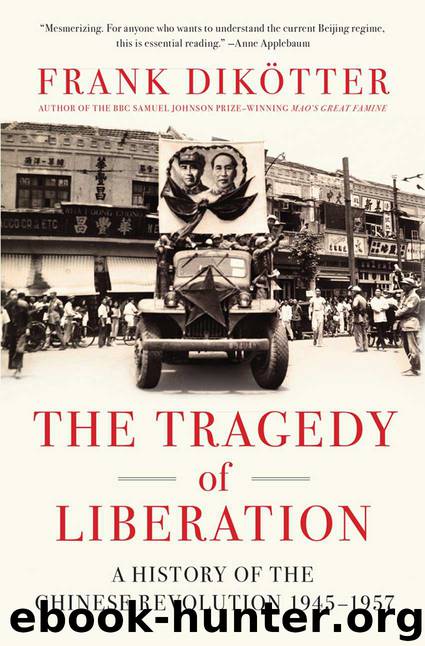The Tragedy of Liberation: A History of the Chinese Revolution 1945-1957 by Dikötter Frank

Author:Dikötter, Frank [Dikötter, Frank]
Language: eng
Format: epub, mobi
Publisher: Bloomsbury Press
Published: 2013-09-24T00:00:00+00:00
The pressure did not abate. Almost every year the regime identified a high-profile scholar as a counter-revolutionary, making him the target of vociferous denunciations by the propaganda machine. After Mao had denounced Hu Shi in August 1949, students and teachers were compelled to distance themselves from the liberal essayist, philosopher and diplomat. As a young student in Hunan, Mao had written enthusiastically about him. In 1919, when Mao had worked as an assistant librarian at Peking University, he tried to audit his classes, but Hu Shi would have none of it: ‘you are not a student, so get out of here!’ Now the Chairman ensured that his work was banned. Hu Shi’s own son stepped forward to repudiate his father as a ‘reactionary’ who had paved the road for capitalism: ‘until he returns to the embrace of the people he will always be the people’s enemy and also my own enemy’. ‘We know, of course, that there is no freedom of speech,’ Hu Shi responded from New York. ‘But few persons realise that there is no freedom of silence, either. Residents of a communist state are required to make positive statements of belief and loyalty.’27
Liang Shuming was another bête noire of the Chairman. Both were born in 1893, but Liang was a brilliant thinker hired at the age of twenty-four by the philosophy department in Peking University when Mao was still an obscure primary-school teacher. A year later, in 1918, the two met briefly at the home of Mao’s teacher in Beijing, although Liang paid the Hunanese student little attention. But in 1938, as the philosopher travelled to Yan’an, a composed and polite Mao instantly recalled the meeting: ‘A long time ago, we met in 1918 at Peking University where you were the big professor and I was part of the lowly library staff. You probably don’t remember that during your frequent visits to Professor Yang’s house, it was I who greeted you at the door.’ Liang left Yan’an highly impressed, although he did not believe that class theory applied to Chinese society or could solve the country’s problems. He maintained an intellectual relationship with Mao, presenting him with copies of his own work. Like others, in 1949 he openly praised the Chairman and embraced the new China. Flattered by the relationship, a year later an amiable Chairman invited him to become a committee member of the Political Consultative Conference. More courtesy visits and pleasantries on the national situation followed, the Chairman on occasion sending his own car to ferry the professor to Zhongnanhai. In September 1950 Mao saw to it that Liang was moved to a private residence near the famous Marble Boat built by the Empress Dowager Cixi in the Summer Palace.
But Liang was no pushover. In 1952, at the height of the attack against private business, he wrote to the Chairman to explain that ‘merchants by no means are all dishonest’, somehow doubting that they were organised enough to launch a concerted attack on the communist party. In a letter widely circulated to the top leadership, Mao denounced these views as ‘absurd’.
Download
The Tragedy of Liberation: A History of the Chinese Revolution 1945-1957 by Dikötter Frank.mobi
This site does not store any files on its server. We only index and link to content provided by other sites. Please contact the content providers to delete copyright contents if any and email us, we'll remove relevant links or contents immediately.
| Central Asia | Southeast Asia |
| China | Hong Kong |
| India | Japan |
| Korea | Pakistan |
| Philippines | Russia |
The Sympathizer by Viet Thanh Nguyen(4385)
The Rape of Nanking by Iris Chang(4203)
World without end by Ken Follett(3474)
Ants Among Elephants by Sujatha Gidla(3463)
Blood and Sand by Alex Von Tunzelmann(3195)
Japanese Design by Patricia J. Graham(3167)
The Queen of Nothing by Holly Black(2587)
City of Djinns: a year in Delhi by William Dalrymple(2554)
Foreign Devils on the Silk Road: The Search for the Lost Treasures of Central Asia by Peter Hopkirk(2463)
India's Ancient Past by R.S. Sharma(2451)
Inglorious Empire by Shashi Tharoor(2437)
Tokyo by Rob Goss(2427)
In Order to Live: A North Korean Girl's Journey to Freedom by Yeonmi Park(2386)
Tokyo Geek's Guide: Manga, Anime, Gaming, Cosplay, Toys, Idols & More - The Ultimate Guide to Japan's Otaku Culture by Simone Gianni(2368)
India's biggest cover-up by Dhar Anuj(2350)
The Great Game: On Secret Service in High Asia by Peter Hopkirk(2344)
Goodbye Madame Butterfly(2250)
Batik by Rudolf Smend(2179)
Living Silence in Burma by Christina Fink(2068)
